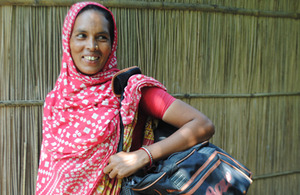An 'Avon lady' of Bangladesh tells her story
How women are transforming their lives with big business ideas

Off to work: Joytara, one of the women whose life has been changed for the better through JITA. Picture: Kathryn Richards/CARE
Joytara is a rarity in Bangladesh, she owns land in her name due to a聽UK aid funded scheme. Before she received this help, the 35-year-old mother of two faced desperation when her husband became paralysed and her work as a maid servant was not enough to sustain her family聽or keep her children in school.
CARE, an international aid agency supported聽by the UK,聽heard about聽Joytara鈥檚 situation and invited her to become an 鈥楢parajita.鈥� 鈥楢parajita鈥� means聽鈥檞omen who will not accept defeat鈥� -聽akin to 鈥楢von ladies鈥� they travel from home to home selling products from private sector partners such as Unilever, Danone, Bata and Grameen that range from shampoos, soaps and sanitary towels to mobile phone packages and shoes.
The programme - called JITA -聽gives vulnerable women an opportunity to earn a decent wage.聽Working to promote gender equality, the scheme聽empowers women to set up their own businesses giving their families a better future.
Joytara tells her story
鈥淭he main problem at first was social acceptance, people didn鈥檛 think a woman should do this sort of work and they thought I was selling fake products, but now I have become accepted in the community.
鈥淧eople used to shun us, they might give us food but they wouldn鈥檛 lend us any money if we needed it. Now I lend money to others who are more needy, and I even advise people in the community. Women who stay in the house with no options should work like me and make themselves independent.
鈥淚 can decide how to spend money. I have two daughters, Shuma, aged 8 and Shumi aged 12. I can keep both my daughters in school and my husband has more respect for me. I have become the main decision maker in our household.
鈥淣ormally it is just men who own land, but recently as a family we bought land and it will be registered in my name. Our house used to be very small, on a small corner of land, it is now much bigger and I am very proud.
鈥淪anitary towels are one of my most popular products. My female customers wouldn鈥檛 ever go to the market to buy these, but I have increased access to these sorts of products as the women can talk freely with me.
鈥淚n the future I would like to start my own shop, it will take a few years to do this but I will receive support from CARE as an incentive for continuing to work as an Aparajita.鈥�
When charity means business
In January this year, the聽scheme is聽thought to be one of the first聽to convert from an NGO聽programme into a business.
CARE聽received support from聽the - a UK aid funded initiative created to聽encourage a business-based approach to development. The support included consultants from Accenture Development Partnership who helped CARE to design a business plan that would successfully balance making a profit and meeting development objectives - to turn the former NGO-managed programme into a commercially viable business. They documented this process in .
Facts and stats
- JITA聽plans to increase the number of rural sales ladies six fold, creating meaningful employment for 12,000 women, as well as adding four regions to the current three, creating a national distribution network.
- The new structure will enable an incentive scheme for the Aparajitas, offering the prospect of setting up their own shops, introduce health insurance benefits and give them mobile phones.
- The UK Government will increase incomes for women through helping 2.3 million women access jobs and supporting 18 million women to access financial services. We will also support reforms to land and inheritance rights to secure women鈥檚 rights to own and use property.